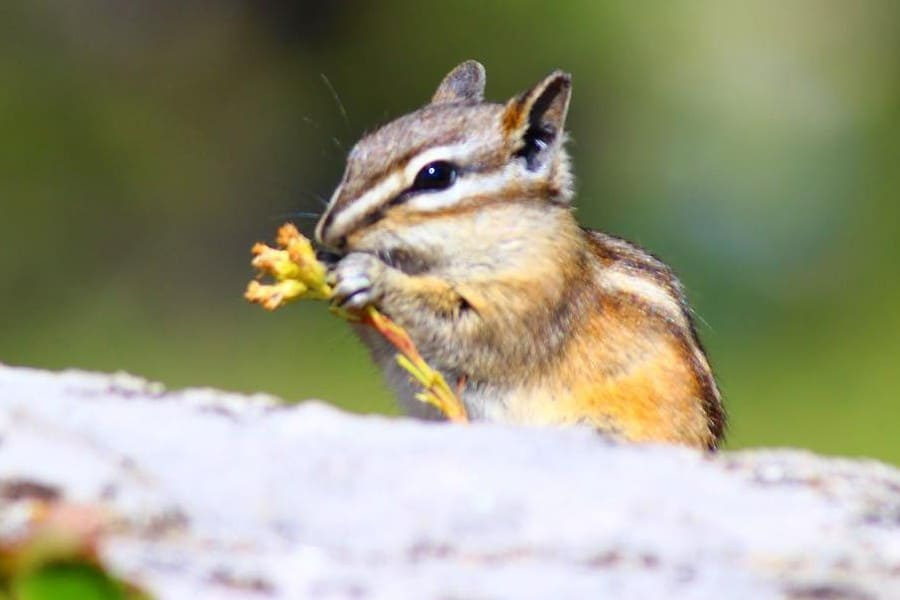Do chipmunks eat tomatoes? Small critters go crazy for them! As cute as these striped creatures are, you definitely don’t want to waste your time and money on feeding them. In addition to eating tomatoes, pests also carry certain diseases and uproot the bulbs of other plants, causing great damage to a garden.
They are not limited to the crop if there are many sources of food on your territory. To solve this problem, it is necessary to use natural methods that do not harm plants but repel rodents. To find out how to keep chipmunks away from tomato plants, read my step-by-step guide!
[wpsm_titlebox title=”How to Protect Your Garden From Rodents?” style=””main””]
- Cover the tomato beds with bird netting.
- Use cages for tomatoes. Bury them below the ground level. Throw a metal or bird net over the top.
- Use repellent sprays. Chipmunks hate the smell of citrus, garlic, cinnamon, mint, and lavender.
- Plant narcissus, asters, purple coneflower, lupine, and black-eyed Susans.
[/wpsm_titlebox]
How to Detect the Presence of Chipmunks in Your Garden?

Spotting a chipmunk eating tomatoes is easy. You will notice traces of their presence everywhere. In the garden, bulbs of plants will be uprooted, and you will see signs of fruit and vegetable chewing. If you have bird feeders nearby, a chipmunk will feast on their contents. Chicken breeders will find that the eggs are also eaten. Take a close look at your yard: Chipmunks dig holes 2-3 inches in diameter, but there are no mounds of earth on the surface as these animals camouflage their tunnels from predators by moving the soil to another place.
How to Keep Chipmunks Away From Tomato Plants: Step-by-Step Guide
No need to use chemicals or traps to get rid of crop-eating pests: A set of measures to protect your garden, subject to all the rules, will give a positive result. Read below about how to stop chipmunks from eating tomatoes.
Bird netting
The first obstacle for rodents is setting the bird net around the garden.
- You will need enough fine bird netting so that you can enclose your garden.
- Hammer small wooden posts around the perimeter of your garden.
- Bury the columns below the ground level.
- Attach the mesh to them to make walls. The height should be convenient to allow you access to the plants (it is typically about 3 feet).
- Also, secure the mesh on top of the tomatoes. This design will protect them not only from chipmunks but also from squirrels and birds.
- You can fix the bird net with elastic cords or ropes.
- For 100% protection, use several layers of mesh.

The application of this material allows you to protect both the entire territory of the garden and individual seedlings. You can throw a bird net over the tomato cages. Remember to check your protective sheet for the holes through which pests can climb.
Cage tomatoes
This method also allows you to limit the access of rodents to your tomatoes.
- Buy metal cages for tomatoes.
- Put such a cage around bushes with vegetables.
- Ensure to sink the bottom edge of the cage into the ground as deep as possible. Such a measure will prevent chipmunks and other pests from undermining.
- Wrap your cages with fine wire mesh.
To harvest, you can simply remove such a cage from a bush and then bury it back into the ground. You can purchase bird netting and tomato cages in the garden center.
Home remedies for keeping chipmunks away
You can use repellents, the ingredients for which you might find at home. Chipmunks hate these smells. You can soak old rags in vinegar and tie them up next to the tomato beds. Coffee grounds scattered around plants will not only repel pests with their aroma but will also act as an excellent fertilizer.
Here are a few more options for repelling rodents:
- Essential oils of citrus;
- Cinnamon;
- Eucalyptus;
- Castor oil;
- Garlic;
- Onion;
- Vinegar;
- Peppermint;
- Lavender;
- Salvia;
- Cayenne pepper;
- Chili pepper.
You can make an effective spray repellent at home:
- Prepare a few cloves of garlic and a whole jalapeño (or cayenne pepper).
- Peel the garlic.
- Thoroughly mash the garlic cloves and chop the pepper.
- Pour in water and leave in a bowl for at least half an hour.
- Strain the mixture and fill a spray bottle with it.
- For greater effectiveness, you can use a garlic oil concentrate.
- It is important to add a teaspoon of any vegetable oil at the end. This will help the repellent stick to the plants and keep the smell longer.
Spray any repellent after watering your garden and rain.
FAQ About Chipmunk Repellents

Read answers to common questions about how to prevent chipmunks from eating tomatoes.
What smells keep chipmunks away?
A chipmunk avoids places where it feels threatened. Therefore, the most effective repellent is the smell of a predator. You can lay out the fur of cats and dogs around the territory. If you don’t have pets, ask your local groomers for fur.
Are there any plants that repel chipmunks?
You can plant many species of natural repellents throughout your yard, including near plantings of tomatoes. These plants will be keeping chipmunks out of the garden. These rodents hate the smell of narcissus, coreopsis, asters, purple coneflower, lupine, black-eyed Susans, salvia, cilantro, lavender, mint, garlic, and onion.
What do chipmunks hate the most?
Chipmunks don’t like a lot of smells. However, the top picks on the list that rodents hate the most are citrus, garlic, pepper, and mint.
Don’t Share Your Tomatoes With Rodents
The desire to rid your garden of pests is dictated not only by greed but also by the rules of hygiene. After all, these rodents carry diseases that are potentially dangerous to human health. Effectively protect plants with these methods by implementing them in combination. With a lot of barriers and unpleasant odors, your territory will become uninteresting for a rodent.
Have you already seen a chipmunk hole or are you reading this post as a preventive measure? Please share your experience of getting rid of chipmunks without chemicals in the comments!

